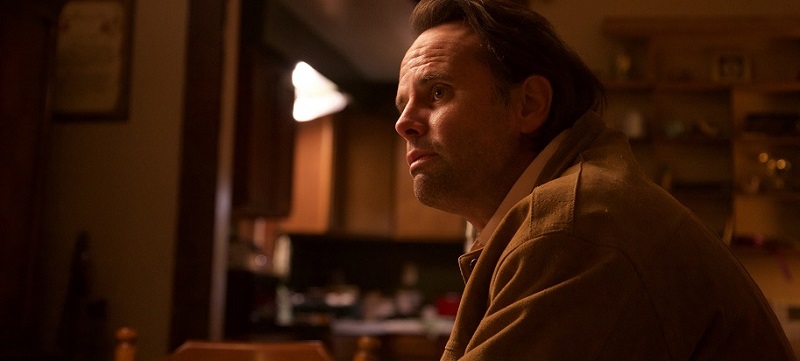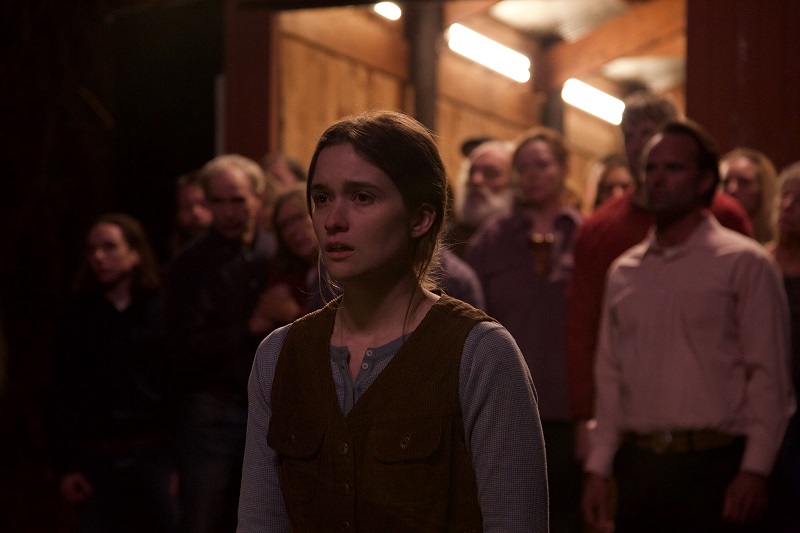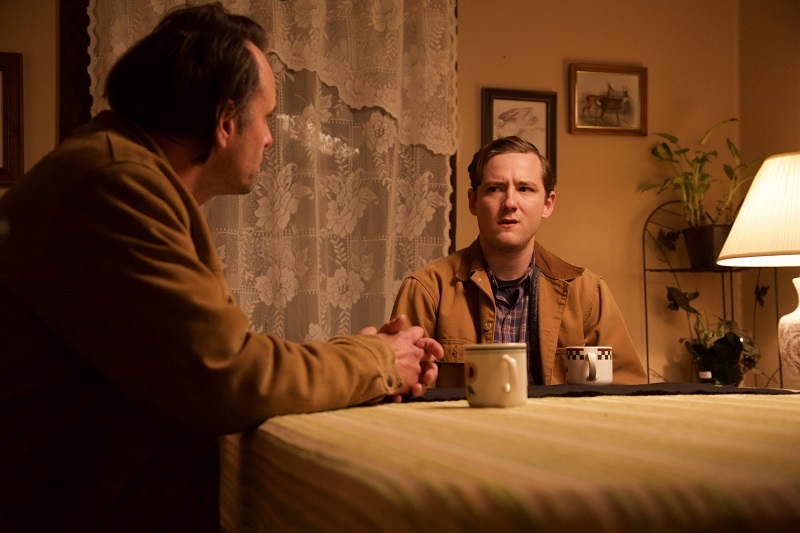Them That Follow possesses an incredible cast, especially considering the fact that the veteran ensemble jumped into the drama ready to work with a writer-director pair who was making their big screen debut. Helmers and screenwriters Britt Poulton and Dan Madison Savage filled their ensemble with veteran character actor Walton Goggins, recent Oscar winner (for Best Actress for The Favourite) Olivia Colman as well as Jim Gaffigan.

The drama that looks at life in rural Appalachia, also features stunning turns from some incredible young talent, such as lead Alice Englert (Beautiful Creatures) as Mara, Kaitlyn Dever (Booksmart) as Dilly, Lewis Pullman (Bad Times at the El Royale) as Garrett and Thomas Mann (Project X, Me, Earl and the Dying Girl) as Augie. Them That Follow centers on Goggins’ preacher Lemuel and his congregation that utilizes “serpents,” aka snakes, in its service to rid souls of sin.
Mara is Lemuel’s daughter and is at a crossroads. She has accepted a proposal for marriage from Garrett, all while being secretly in love with Augie and she just discovered that she is pregnant with his baby. None of this is going to go well for her without a whole lot of pain and suffering, emotionally and physically (those serpents’ bites don’t tickle).
Goggins has put together an incredible career and the role of Lemuel fits him like a glove. The Alabama born actor has bounced from television to film and explored every genre in storytelling to great acclaim and audience adoration. The Movie Mensch received a call from Goggins, and it resulted in the most informative of exclusive interviews.
He waxed poetic about the stunning talent announcement that is Them That Follow. Creators Poulton and Madison, Goggins reported, have a gift beyond compare and it was when he received the script that immediately he knew he had to do everything he could to be a part of this magnificent tale. The esteemed actor also revealed the secret to his success in terms of what he looks for in a project and how variety has been the spice of life for him as he zig-zagged through a myriad of characters that, after witnessing those works, we could never imagine anyone else in those roles. That is certainly the case with Them That Follow and to hear Goggins go even deeper about the subject matter, his castmates and the gift that is every day for him as an actor is nothing short of brilliantly fascinating.
The Movie Mensch: I talked with Britt Poulton and Dan Madison earlier and was just so impressed with these two moviemaking neophytes. I just loved this movie. I loved you in it. What was it about Britt and Dan’s script that you were eager to jump into this pool? I mean, they’re also first time directors, too.
Walton Goggins: They’re first time directors, and they’re a team. And when I read it, I couldn’t believe this existed. I felt like it was a part of the lexicon of cinema. You know what I mean? Yet I couldn’t believe it existed at the same time. So, I desperately wanted to meet them and to see the origin. Who are the people that penned this? Where’d this come from? I met with them. We had a long conversation and their story was so interesting. How they became partners and how and why they stumbled upon to this particular subculture in America, I thought that they were so even-handed about it. They did it without judgment. They placed this young woman, and her father and this community, in a circumstance that—for them—is life or death. Not just for this world, but for life hereafter. I thought, “what an opportunity, man!” I was really just blown away by the possibility of what it could be.
The Movie Mensch: It sure added up to a lot. I still can’t shake it, nor do I want to because it just grabs you. It sucks you in immediately. You are in that world instantly and they never let you go … just something stunning. Your characterization threaded a needle with this pastor that was just so brilliant.
Walton Goggins: Blessed for saying that, man.
The Movie Mensch: He may be a soul that few of us can identify with, but you made him so approachable, yet commanding in his beliefs, tender in spots. It gave me chills. How did you see this guy in terms of his background, his view of the world and how to interpret what your writer/directors gave you on the page?
Walton Goggins: We had long conversations about it early on. I tend to stick in the generalities of something, and then get very specific about moments and say, “Well, what does this mean? What do you mean by this? This is how I see this. This is what I mean by this.” Then I get there [on set] and then I do my thing. My job is to tell them their story.

The Movie Mensch: Do you think that he is a certain type of protagonist?
Walton Goggins: No, I never saw him as a villain, I never saw him as a hero. I never saw him as anything other than a person that loved this community, and loved his daughter, and loved God. I never saw this as practicing something that was out of the ordinary. I never saw it as militant. I never saw it as anything other than … this is a literal interpretation of this Bible and of this passage in the Bible. This isn’t a cult, man, you know? These people have been doing this for 125 years. I guess what I saw, more than anything, is epitomized in the speech that he gives about the police coming into this church and taking away the very thing that we use to show our devotion to God. Subsequently, they don’t understand you. They don’t understand it. They don’t understand and they’re scared of it. When I read that for the first time, I saw it as with great pain. I would say that about the LGBT community. I would say that about the African American community. I would say that about anything that we’re all without information. We’re all coming from a place of fear. When in our hearts, these are people that just want to live their life.
The Movie Mensch: His view is very black and white, though. Especially when it comes to his daughter.
Walton Goggins: That’s where Lemuel really landed for me. At the end of the story, because there is no room for human forgiveness in this way, that this has to come from the God that they all believe in. He’s asking, “Please,” alongside his daughter. But for him it’s, “Please, please God, please don’t ask me to give up my daughter, please.” Because this is life or death, not just now, but for eternity. I think that if you can do that and you can do that in a way that is meaningful, that the audience may not agree with you on any level, but at least they understand your pain. And I think to do it any other way would be doing a disservice to his journey and to this community’s journey, both in this movie and in real life.
The Movie Mensch: Yeah, I felt your pain, and I also felt a mirrored pain in Alice, and you got a front row seat to her …
Walton Goggins: Oh, buddy.

The Movie Mensch: She just … wow.
Walton Goggins: Oh, I got to tell you what she did [and] what Olivia did.
The Movie Mensch: Yes!
Walton Goggins: Oh God, Alice was so … I would put her (expletive) performance up against anything. It has a foot in the past, and it has a foot in the movement that we are living now, and the liberation of women in a patriarchal society. What she did and how she interpreted Mara and lovingly making this decision was just so impressive. I wanted to make it hard for her, and she did it, man. She made it hard for us ’cause it was through her lens in which she said, so stoically, with such bravery and with such regret, that “I’ve got to go, Daddy, and I love you, but I’m gonna go.” That she made this (expletive) decision. I’m so proud of this character, fictionalized character, Mara, and I’m so proud of Alice, man. She just fucking killed it, man.
The Movie Mensch: The movie doesn’t work without her doing what she did.
Walton Goggins: It doesn’t. No. And you know, there are a lot of people out there in this time that are telling these stories and have the opportunity to be a part of this conversation, but they’re not doing this. She (expletive) did it.
The Movie Mensch: Yeah.
Walton Goggins: We weren’t where we were two years ago. It was just the beginning of this conversation. We were at a little bitty town in Ohio filming this story about a young woman finding her voice and living her life her way and walking away from something that wasn’t abusive, [but] something that was embracing her with love, and she knew it. But it was time for her to think for herself. She’s awesome. Everybody in it is—Olivia, Thomas, Lewis, and Kaitlyn. The stars aligned and gave us the opportunity to come together to remind us of why story is powerful, and why we’re doing this in the first place, man.

The Movie Mensch: Your career has been rich and varied in terms of roles and subject matters. Has the variety happened more organically, or is that something you sought out at the beginning?
Walton Goggins: I don’t think anyone is given the opportunity to seek that out in the beginning. I think you make the most of what you’re given, really. The opportunities that you’re given. And then maybe because of those choices or that work, and luck, you’re able to kind of build upon it. That’s where I’ve kind of found myself, really. None of this is destined, or maybe it’s all destined. Either it will work, or it won’t work. You have your time, and so what do you do with a microphone when it’s passed to you? I’m just trying to do the best I can with the opportunities that are given me, and then walk away when I need to. That simple. I think most actors worth their weight in salt would say the same thing.
